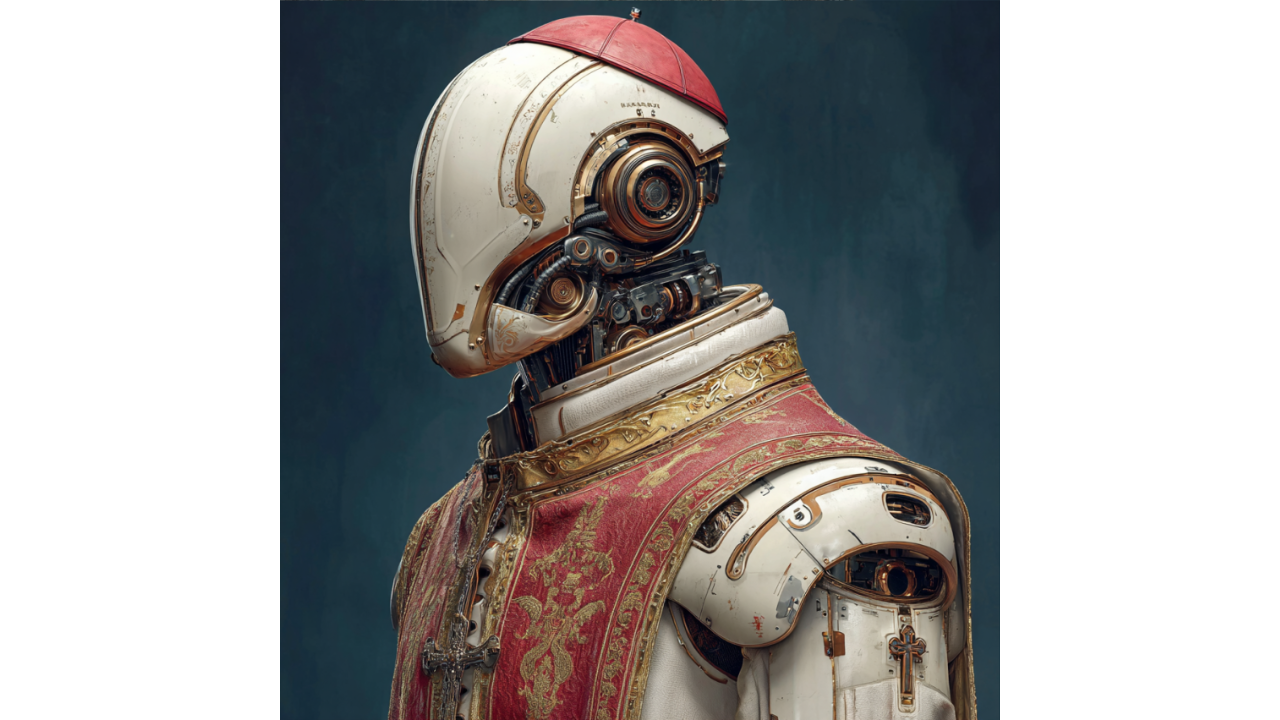Pope Leo XIV Rejects Building an 'AI Pope'
When Pope Leo XIV told tech bros to take their "virtual pope" idea and shove it in the nearest recycling bin, he didn't just reject a product...
5 min read
 Writing Team
:
Jun 19, 2025 8:00:00 AM
Writing Team
:
Jun 19, 2025 8:00:00 AM
-3.png)
Pope Leo XIV has made artificial intelligence ethics a cornerstone of his papal mission, positioning the Catholic Church as a moral leader in humanity's most consequential technological transition. In his first formal address to the College of Cardinals, the newly elected pontiff explicitly linked his choice of papal name to addressing "developments in the field of artificial intelligence that pose new challenges for the defense of human dignity, justice and labor."
This isn't reactionary resistance to technological progress—it's proactive moral leadership. Leo XIV, the first American pope, brings both a mathematics background and deep missionary experience to bear on what he calls "another industrial revolution." His approach represents a sophisticated understanding that artificial intelligence, like previous transformative technologies, requires ethical frameworks to ensure it serves human flourishing rather than undermining it.
Building on a Foundation of Innovation
The Vatican's engagement with AI ethics didn't begin with Pope Leo XIV—it represents the culmination of years of thoughtful collaboration between religious and technological leaders. In 2020, the Vatican partnered with Microsoft and IBM to launch the "Rome Call for AI Ethics," establishing six fundamental principles: transparency, inclusion, responsibility, impartiality, reliability, and security with privacy.
This groundbreaking initiative has grown into a global movement, with major technology companies including Cisco, Qualcomm, and others joining the commitment. The Rome Call has expanded beyond Western Christianity to include Eastern religions, creating an unprecedented interfaith coalition for ethical AI development. By 2024, representatives from eleven world religions gathered in Hiroshima to reaffirm their commitment to human-centered artificial intelligence.
What makes this remarkable is the Vatican's role as a bridge-builder rather than a barrier-creator. Rather than condemning technological advancement, the Church has positioned itself as a collaborator in ensuring AI development aligns with human values and dignity.
Pope Leo XIV's choice of papal name reveals both historical awareness and strategic vision. His namesake, Pope Leo XIII, authored the revolutionary 1891 encyclical "Rerum Novarum" that established Catholic social teaching in response to the Industrial Revolution. That document didn't reject industrialization—it provided moral frameworks for ensuring technological progress served human dignity rather than exploiting it.
Now, Pope Leo XIV faces an analogous challenge with artificial intelligence. Just as Leo XIII addressed the "social question" of industrial capitalism, Leo XIV must navigate the human implications of algorithmic systems that will reshape work, relationships, and society itself. The parallel is both inspiring and instructive: technological revolutions require moral leadership, not moral panic.
The new pope's approach reflects this understanding. Rather than condemning AI as inherently dangerous, he's calling for "responsibility and discernment" to deploy AI's "immense potential" to benefit rather than degrade humankind. This represents exactly the kind of nuanced, constructive leadership the moment requires.
The Vatican's relationship with major technology companies demonstrates the power of collaborative rather than adversarial approaches to AI governance. Companies like IBM, Microsoft, and Cisco haven't been dragged into ethical commitments—they've actively sought Vatican partnership in developing responsible AI frameworks.
IBM Senior Vice President Darío Gil emphasized that "artificial intelligence is just a reflection of its makers" and needs diverse institutional collaboration. Microsoft President Brad Smith has argued that AI should be guided by "strong ethics built of global human rights traditions." These aren't reluctant concessions to religious pressure—they're genuine recognition that technological power requires moral guidance.
The Rome Call's success stems from its practical rather than theoretical approach. Instead of abstract moralizing, it provides concrete principles that technology companies can implement: ensure AI systems are explainable, eliminate bias, maintain human oversight, protect privacy, and operate reliably. These aren't anti-innovation constraints—they're pro-humanity guidelines that make AI more trustworthy and ultimately more successful.
For marketing professionals, Pope Leo XIV's approach offers valuable insights into leading technological transformation responsibly. The marketing industry sits at the intersection of AI capability and human psychology, making it a crucial testing ground for ethical AI deployment.
The Vatican's principles translate directly to marketing applications: transparency in algorithmic decision-making, inclusion in audience targeting, responsibility for AI-generated content, impartiality in data analysis, reliability in performance measurement, and security in customer data handling. These aren't regulatory burdens—they're competitive advantages that build customer trust and long-term brand value.
Smart marketing leaders are already implementing Rome Call principles in their AI strategies. They're ensuring AI-generated content maintains brand authenticity, using algorithmic audience targeting that avoids discriminatory bias, and maintaining human oversight of AI-driven customer interactions. This approach positions marketing as a leader in responsible AI deployment rather than a laggard awaiting regulation.
Pope Leo XIV's leadership comes at a crucial moment when nations, companies, and institutions worldwide are grappling with AI governance challenges. China, the European Union, and the United States are developing different regulatory approaches, while technology companies face increasing pressure to demonstrate ethical AI development.
The Vatican's approach offers a compelling alternative to purely regulatory solutions: moral leadership that inspires voluntary compliance rather than mandating it. The Rome Call has attracted signatories across religious traditions, technology companies, and educational institutions because it provides clear principles without stifling innovation.
This model has particular relevance for American technology leadership. As Congress debates AI regulation and companies navigate ethical deployment challenges, the Vatican demonstrates how moral authority can complement rather than compete with technological expertise. Pope Leo XIV's mathematics background enables him to engage substantively with AI capabilities while his pastoral mission keeps human dignity central to the conversation.
Pope Leo XIV's AI focus builds naturally on Pope Francis's pioneering work in technology ethics. Francis became the first pope to address a G7 summit on AI dangers, warning against a "technocratic paradigm" that reduces human complexity to algorithmic categories. He raised concerns about AI systems lacking wisdom in decision-making and their potential for lethal autonomous applications.
The Vatican's 2025 document "Antiqua et Nova" (Ancient and New) reflected deeply on the relationship between artificial and human intelligence, warning against creating AI as a "substitute for God" while recognizing its potential to enhance human capabilities. This theological framework provides crucial grounding for Leo XIV's more focused AI ethics mission.
Francis's work established the intellectual foundation; Leo XIV is building the institutional framework for sustained engagement with AI ethics. This represents continuity rather than departure, evolution rather than revolution in Vatican technology policy.
What makes Pope Leo XIV's approach particularly compelling is its prophetic rather than reactive character. He's not responding to AI disasters—he's anticipating AI challenges and providing moral frameworks before they become crises. This represents exactly the kind of leadership religious institutions can provide in technological transitions.
The pope's focus on "human dignity, justice and labor" addresses AI's most significant social implications: algorithmic bias that undermines human equality, automated decision-making that removes human agency, and job displacement that threatens economic security. These aren't distant concerns—they're current realities requiring immediate attention.
By positioning the Church as a partner in addressing these challenges, Pope Leo XIV creates space for constructive dialogue between technologists and ethicists, innovators and humanists, efficiency and dignity. This approach has far more potential to influence AI development than either uncritical adoption or blanket opposition.
Pope Leo XIV's AI ethics leadership represents a master class in moral authority during technological transition. Rather than rejecting innovation, he's championing responsible innovation. Instead of condemning progress, he's calling for progress that serves human flourishing. Rather than standing aside from technological development, he's positioning moral wisdom at its center.
This approach offers lessons for every leader navigating AI transformation: engage rather than avoid, collaborate rather than condemn, guide rather than obstruct. The future of artificial intelligence will be shaped not by technologists alone or ethicists alone, but by their collaboration in service of human dignity.
Pope Leo XIV's papacy begins with this fundamental recognition: the most powerful technologies require the deepest wisdom. His leadership in AI ethics positions the Catholic Church not as a relic of the past but as a guide for the future, demonstrating how ancient values can illuminate modern challenges.
The question isn't whether artificial intelligence will transform society—it's whether that transformation will honor human dignity. Pope Leo XIV has committed his papacy to ensuring it does.
When your AI strategy needs more than technical expertise, you need partners who understand both innovation and human values. Winsome Marketing's growth experts help organizations navigate AI transformation with ethical frameworks that protect brand integrity while maximizing competitive advantage. Let's build AI solutions that serve both efficiency and dignity.

When Pope Leo XIV told tech bros to take their "virtual pope" idea and shove it in the nearest recycling bin, he didn't just reject a product...

Reese Witherspoon just said the quiet part out loud: AI isn't coming for Hollywood—it's already moved in, redecorated, and started charging rent. Her...

1 min read
Finally, an AI story that doesn't make us want to hide under our desks. While we're all debating whether ChatGPT will steal our jobs or deepfakes...